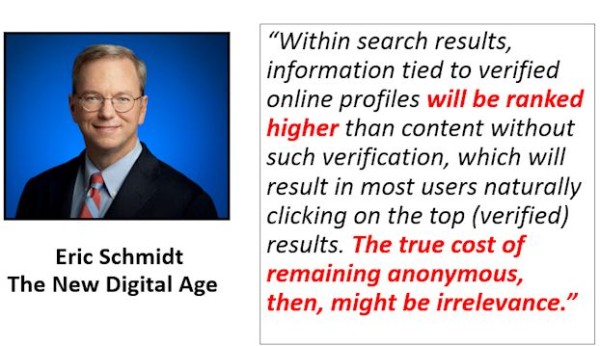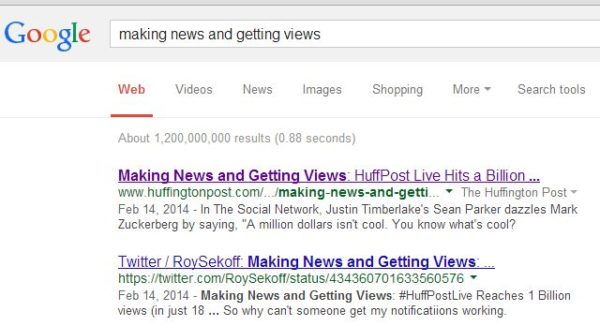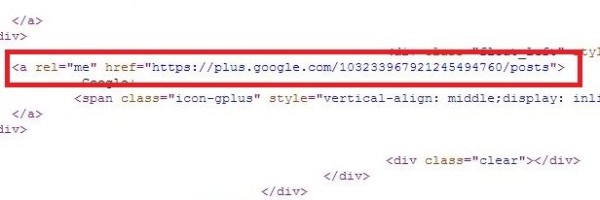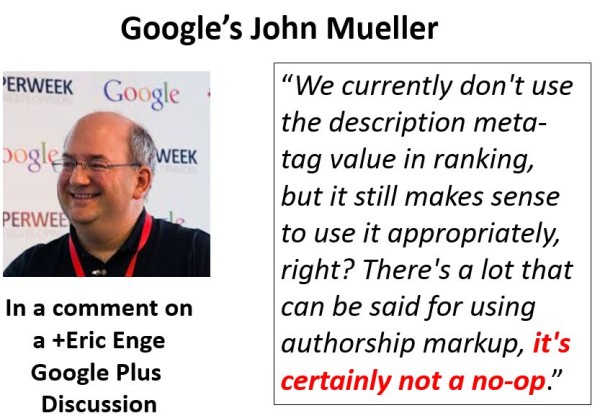Is Chasing AuthorRank A Waste Of Time For SEOs?
On June 7, 2011, Google announced support for a new type of markup called the Authorship Tag. This was the rel=”author” tag. It did not take long before the speculation started — when would Google start using data from this new tag to impact rankings? The industry took to referring to this concept as AuthorRank. […]
On June 7, 2011, Google announced support for a new type of markup called the Authorship Tag. This was the rel=”author” tag. It did not take long before the speculation started — when would Google start using data from this new tag to impact rankings?
The industry took to referring to this concept as AuthorRank. Note that Google never uses this term, and they continue to talk only about “Authorship.”
However, Google has continued to fan the flames with periodic comments on this topic, the most famous of which came from Google executive chairman Eric Schmidt in his book The New Digital Age:
What Is The Reality Of AuthorRank?
It is still not clear that Google has done anything with this yet. There are many that claim AuthorRank is already a ranking factor, and occasionally, we hear someone offering proof. The short form of this “proof” is that a one-year-old post had rel=author tagging added (which incorrectly attributed the post to Rand Fishkin) and suddenly the post shot up from a 9 to 12 ranking range to number 1.
Must be AuthorRank, right? However, Stone Temple Consulting’s Mark Traphagen summarized the challenges with this example well in his comment on the post:
To add to some of the other comments indicating that this test lacked a few controls I’d like to see before I would accept “Aha! Author Rank!” your interview has been online for almost a year now. We’ve seen other cases where making any change to an older post, but especially adding Authorship, can cause Google to re-crawl the post, and in so doing perhaps pick up other signals or relevancies that it hadn’t before.
The fact is these types of stories are rare, creating a far greater likelihood that there is “nothing to see here” than that we should exclaim, “Aha! Author Rank!”
In addition, in December, we saw Google take some visible action based on an author-trust-like basis. This was when they started removing photos in some cases for people who had correctly implemented Authorship. What makes this interesting is two things:
- It was the first obviously tangible and visible action based on Authorship
- There was no ranking-based action as part of it
To me, this is a clear indication that they are not yet ready to do more. You can read Mark Traphagen’s comprehensive commentary on this here.
Implementation Problems
A lot of people get the implementation of Authorship wrong. Consider this result from the Huffington Post:
The Authorship photo is missing! Looking a bit closer at the HTML for this article, there is no markup related to Google Plus on the article page. You can +1 the article, but there is nothing that points to her author profile. You do find the following tag on her Author Page:
Nowhere does her content include a proper rel=author tagging. Note that the rel=”me” tag we saw on her author page is a holdover from the process for implementing rel=author using the method originally announced by Google, which was called the 3 link method. I won’t recount it all here, but suffice it to say that the markup is broken. The acid test is this output from Google’s Structured Data Testing Tool:
This shows that major publishers can make mistakes with this tagging. It obviously is not moving the needle for them, or else they would have already fixed it. Google is prone to errors, too. Here is an example from a little over a year ago:
Looks like Authorship is showing up just fine, right? Trouble is, I didn’t write the article, Stephan Spencer did. To make matters even more interesting, the rel=author markup attributing that article to Stephan was 100% correct, and Google credited it to me, anyway!
Why is this so hard? The web is a complex place. There are many who don’t bother to implement rel=author tags, including famous authors. There are others who get it wrong, or had it right for a while, and then break it. Finally, Google itself makes mistakes.
The bottom line is that Google would love it if there could be a ranking signal here, but it is just not easy for them to do.
The Other Elephant In The Room — PublisherRank
There is one more part to this story. On August 6, 2013, Google announced a new feature called In-Depth Articles. Here is an example result for a search on “history of world war 2”:
Like many, my initial impulse was that this was tangible evidence of the quality of the published content. But a quick examination tells us that this is not AuthorRank. Instead, this feature seems to be much more closely related to the authority of the publisher. You can think of this as PublisherRank if you like (though Google does not use this term, either).
Even so, this is a pretty niche application, and these results always sit at the bottom of the first page of the SERPs, even now, more than six months after its initial release. Who a publisher is seems much easier to track, to me, and yet this new feature appears to have a minimal footprint in the SERPs.
Where Do We Go From Here?
Here is the real question: even if Google had much better Authorship data, would using it as a ranking factor improve the search results? This is a far harder question to answer than you might think. This does not mean that Google does not use it, or won’t use it at all. Consider what Google’s John Mueller said on this Google Plus Discussion:
Earlier in the same thread, he also said: “Even if there’s never a direct ranking effect, it’s not bad to be known to create great content.” That tells the story right there. So, Google does something with it, but it does not appear to be ranking related, as this time.
My own prediction is that we will see some more tinkering with niche scenarios like In-Depth Articles. These may continue to be driven more by Publisher Authority than Author Authority, or perhaps we will even see something author specific.
Ultimately, it is all only a curiosity to me, and that is all it should be for you, too. Chasing the notion of AuthorRank can only lead you to behavior which will run counter to what Google wants to see and detect, anyway. It is a fool’s errand, and I urge you to not do it.
Instead, step back, and imagine what you would do if there were no Google or Bing. If search engines suddenly became illegal, you’d be really happy if you had built your reputation online in a big way.
Maybe someday, clear signs of a real AuthorRank will emerge, and that could be pretty interesting, but I suspect that any impact in the near future will be subtle and small. However, if I am wrong and the impact is big, guess how Google will design the algorithm — to reward those who focused on their brand and reputation all along.
Contributing authors are invited to create content for Search Engine Land and are chosen for their expertise and contribution to the search community. Our contributors work under the oversight of the editorial staff and contributions are checked for quality and relevance to our readers. The opinions they express are their own.
Related stories
New on Search Engine Land






